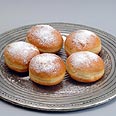
Hanukkah: Doughnuts go healthy
After shrinking it, bakeries continue to find new ways to keep doughnut alive with new health food trend. This Hanukkah, sufganiyot to be fried in canola oil or baked
Hanukkah is THE pastry holiday, with bakers slaving 24 hours a day and ovens working around the clock. All to keep up with the doughnut demand of the season.
Lately, bakers have been going to all lengths to make the product taste better, but at the same time with less fat as to better suit the healthy lifestyle more and more people are adopting.
In previous years the sufganiya has shrunk from 100 grams (about 3.5 ounces) to half its size.
This new sized doughnut has been given the name "mini", with fewer calories. There is even a "bite-sized sufganiya" on the market now, and this stands at about 1.2 ounces. Anything to keep the consumer happy.
The coming Hanukkah will witness a further donut upgrade. The Roladin bakery chain has declared a doughnut revolution, offering even healthier doughnuts this year: No longer will the doughnuts be fried in regular oil, but rather in canola oil, which is known for its cholesterol reducing capacities, will be used instead.
Roladin CEO Kobi Hakak explained that this year the sufganiya will be "smaller, healthier, and better – the mini jelly sufganiya will only contain 169 calories."
According to Hakak, this year, 90 percent of the chain's doughnut products will be mini sufganiyot.
Canola or not, it's like trying to make chocolate a healthy food. There are just some kinds of foods that will never be healthy, no matter what you do to them.
At Lehem Erez they have declared a "Hanukkah miracle" by offering non fried doughnuts. They propose to do this by making brioche, a "baked doughnut". This has a slightly different look and texture, but is similar enough to the original sufganiya.
Brioche is a French pastry, which is light and fluffy compared to the heavy, fried sufganiya.
"An amazing pastry with little sugar and a lot of butter, stuffed with cream," the chain explained. "About a third or more of the brioche's weight is butter."
So where does the health come in? Erez Komrovsky, one of the chain's owners explained that "butter is much healthier than margarine, since is doesn’t have trans fats, so we should make sure the amount of butter flowing in the veins is increased."
Special Filling
Either way, according to a survey done by Teleseker, only 20 percent of Israelis don’t eat sufganiyot at all on Hannukah. Most Israelis will be eating doughnuts of different sizes and different flavored stuffings.The sufganiyot market generates around NIS 60 million per year (about USD 14 million). Barry Shan, Pillsbury's marketing manager in Israel, said that the average Israeli will eat about four sufganiyot during the week of Hanukkah.
Different companies offer different flavors, shapes, and sizes.
Flavors include strawberry jelly, caramel, chocolate, vanilla, blueberries, taffy, coffee fillings and more.
Suvgania prices range from about NIS 2 to NIS 6 (from about 50 cents to USD 1) depending on size and store.
Still, the traditional jelly-filled sufganiya can be found in every bakery. Each doughnut contains one spoon of jelly, which has 35 calories.












